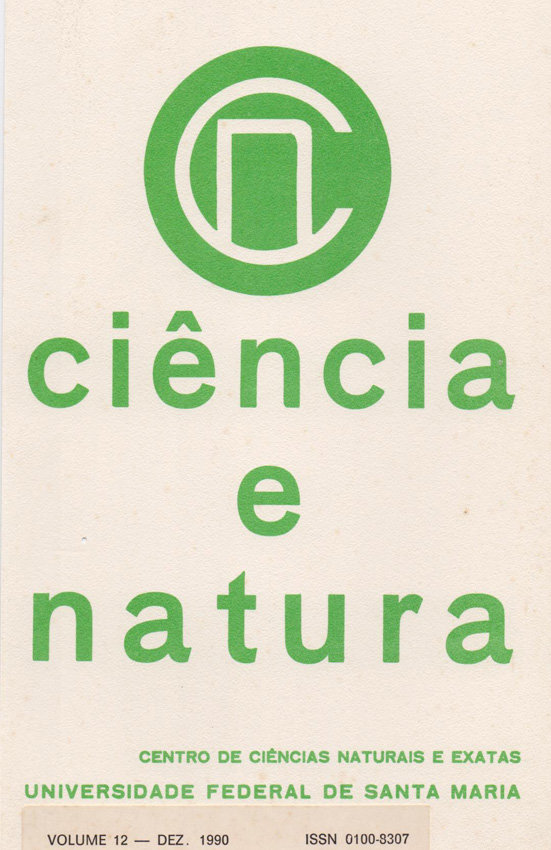Icnofósseis em afloramentos do Rio Grande do Sul: nota preliminar
DOI:
https://doi.org/10.5902/2179460X26228Resumo
O trabalho não apresenta resumo.
Downloads
Referências
ANDREIS, R.R. 1989. Integração litoestratigráfica das sequências triássicas Sul-riograndenses e do Norte-Uruguaio. Relatório FAPERGS- Proc.1379/88. Inédito.
ANDREIS, R.R.,ROLON,A. e DUTRA,T.L. 1989. O afloramento de Cambaí Grande, uma nova interpretação. In: INTERNATIONAL CONGRESS OF CARBONIFEROUS- PERMIAN STRATIGRAPHY AND GEOLOGY, 11 Buenos Aires, 1989. Anais... Buenos Aires.
CRIMES, T.P.1973. Trace Fossils. Sedimentology, 20 (1):119-131.
FREY, R.W. e PEMBERTON, S.G. 1984. Trace fossils facies models. In WALKER, R.G. ed. Facies Models. Canadá, Geoscience. Reprint Series 1.
LAVINA, E.L. e AZEVEDO,S.A. 1983. Geologia da Folha de Posto/ Queimado, RS. Convenio URGS-FINEP 33.82.0324.00. Instituto de Geosciencias, Porto Alegre, Mapa 2 (Relatório Interno).
LAVINA, E.L., NOWATZKI, C.H., SANTOS, M.A. e LEÃO, H.Z. 1985. Ambientes de sedimentação do Super-Grupo Tubarão na região de Caeira do Sul, RS. Acta Geologica Leopoldensia, 21:5-76
NETTO, R.G. 1987. Sobre a ocorrência de Neonereites Seilacher, 1960 no Permiano do Rio Grande do Sul. In: CONGRESSO BRASILEIRO DE PALEONTOLOGIA, 10, Rio de Janeiro, 1987. Anais... Rio de Janeiro, SBP, p.285-287.
NETTO, R.G. 1988. Paleoicnologia dos sedimentitos basais da Formação Rio do Rasto, no Rio Grande do Sul. Tese (Mestrado). Curso de Pós-Graduacão em Geosciências, UFRGS. Porto Alegre.
NETTO, R.G. 1989. Paleoicnologia das seqüências eólicas sotopostas à Formacão Botucatú no Rio Grande do Sul. Acta Geologica Leopoldensia, 28.31-44.
NOWATZKI, C.H., SANTOS, B.R.,SANTOS,M.A. e GONZAGA,T.D. 1983. Atlas de estruturas sedimentares Pré-Gondwânicas e Gondwânicas do Estado do Rio Grande do Sul, Brasil. Parte II. Estruturas Sedimentares Químicas e Orgãnicas. Acta Geologica Leopoldensia, 15: 5 - 32.
PINTO, I.D. e CLOSS, D. 1967. Indice remissivo dos fósseis do Rio Grande do Sul. Iheringia, 1:3-76.
SCHNEIDER, R.L., MUHLMANN, H.,TOMMASI, E., MEDEIROS, R.A.,DAEMON, R.F. e NOGUElRA, A.A. 1974. Revisão estratigráfica da Bacia do Paraná In: CONGRESSO BRASILEIRO DE GEOLOGIA, 28, Porto Alegre,1974. Anais... ,1.,SBG,p.41-65.
SEILACHER, A.,1967. Bathymetry of Trace Fossils. Marine Geology, 5: 413-428.
ZINGANO, A.G. e CAUDURO,A.C. 1959. Afloramentos fossilíferos do Rio Grande do Sul. Boletim ICN,8:1-48.
Downloads
Publicado
Como Citar
Edição
Seção
Licença
Para acessar a DECLARAÇÃO DE ORIGINALIDADE E EXCLUSIVIDADE E CESSÃO DE DIREITOS AUTORAIS clique aqui.
Diretrizes Éticas para Publicação de Revistas
A revista Ciência e Natura está empenhada em garantir a ética na publicação e na qualidade dos artigos.
A conformidade com padrões de comportamento ético é, portanto, esperada de todas as partes envolvidas: Autores, Editores e Revisores.
Em particular,
Autores: Os Autores devem apresentar uma discussão objetiva sobre a importância do trabalho de pesquisa, bem como detalhes e referências suficientes para permitir que outros reproduzam as experiências. Declarações fraudulentas ou intencionalmente incorretas constituem comportamento antiético e são inaceitáveis. Artigos de Revisão também devem ser objetivos, abrangentes e relatos precisos do estado da arte. Os Autores devem assegurar que seu trabalho é uma obra totalmente original, e se o trabalho e / ou palavras de outros têm sido utilizadas, isso tem sido devidamente reconhecido. O plágio em todas as suas formas constitui um comportamento publicitário não ético e é inaceitável. Submeter o mesmo manuscrito a mais de um jornal simultaneamente constitui um comportamento publicitário não ético e é inaceitável. Os Autores não devem submeter artigos que descrevam essencialmente a mesma pesquisa a mais de uma revista. O Autor correspondente deve garantir que haja um consenso total de todos os Co-autores na aprovação da versão final do artigo e sua submissão para publicação.
Editores: Os Editores devem avaliar manuscritos exclusivamente com base no seu mérito acadêmico. Um Editor não deve usar informações não publicadas na própria pesquisa do Editor sem o consentimento expresso por escrito do Autor. Os Editores devem tomar medidas de resposta razoável quando tiverem sido apresentadas queixas éticas relativas a um manuscrito submetido ou publicado.
Revisores: Todos os manuscritos recebidos para revisão devem ser tratados como documentos confidenciais. As informações ou ideias privilegiadas obtidas através da análise por pares devem ser mantidas confidenciais e não utilizadas para vantagens pessoais. As revisões devem ser conduzidas objetivamente e as observações devem ser formuladas claramente com argumentos de apoio, de modo que os Autores possam usá-los para melhorar o artigo. Qualquer Revisor selecionado que se sinta desqualificado para rever a pesquisa relatada em um manuscrito ou sabe que sua rápida revisão será impossível deve notificar o Editor e desculpar-se do processo de revisão. Os Revisores não devem considerar manuscritos nos quais tenham conflitos de interesse resultantes de relacionamentos ou conexões competitivas, colaborativas ou outras conexões com qualquer dos autores, empresas ou instituições conectadas aos documentos.






